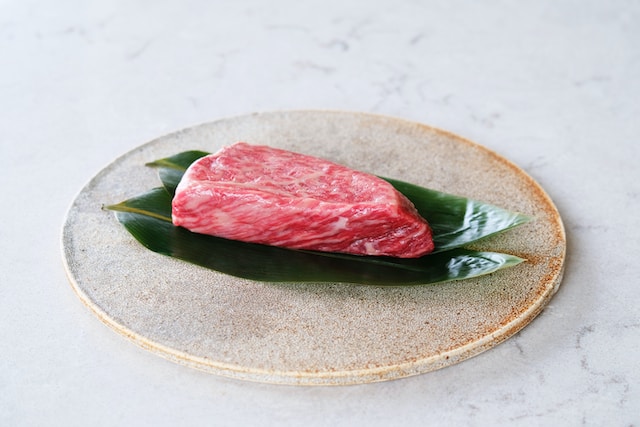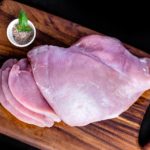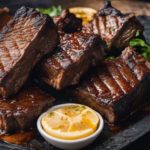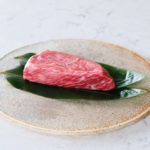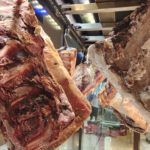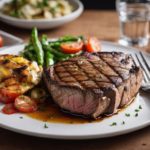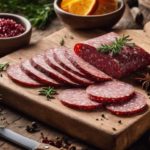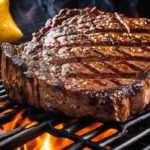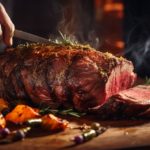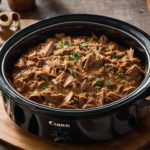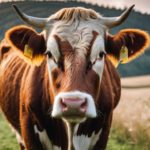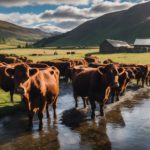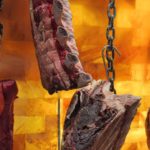Ever found yourself pondering on why Wagyu beef tends to put such a dent in your wallet? Believe me, you’re not alone. I decided to embark on a little culinary journey of discovery – a meaty expedition if you will, aimed at unveiling the truth behind this luxurious feast.
In my blog, we’ll delve into the intricacies of Wagyu; from its one-of-a-kind genetic makeup and specialized diet to its intricate production process. These factors blend together to attribute towards that eye-watering price tag.
So stick around if you’re intrigued by the fascinating world of luxury beef!
Key Takeaways
- Wagyu beef is expensive because of its unique genetics, specialized diet, extensive marbling, and meticulous aging process.
- Wagyu cows have special genes that give the meat its amazing taste and texture. Raising them takes more time and care than regular cows.
- The high cost also comes from the strict regulations, limited availability of land for production, slow growth rate of Wagyu cows, intensive care and feeding required, strict quality control measures, and handcrafted techniques used in the production process.
- The exclusivity of Wagyu beef contributes to its high price as it is produced in limited quantities in specific regions. Its reputation as a prestigious gourmet food adds to its allure.
What Makes Wagyu Beef Unique
Wagyu beef stands out due to its exceptional genetics, carefully controlled diet, extensive marbling, and meticulous aging process.
Genetics
Wagyu cows are special. They have different genes than other cows. These genes make them unique and give the meat its amazing taste and feel. This is why we love Wagyu beef so much! The marbling in the beef is all thanks to these special genes too.
The more fat a steak has spread out in it, the more tasty it will be. And Wagyu cows do this best! But, because of these neat genes, raising Wagyu cows takes more time and care than regular ones.
This can add to their price tag but for good reason – you get an unbeatable meal out of it!
Diet
The diet of Wagyu cattle plays a crucial role in the high cost and unique flavor of Wagyu beef. These cows are fed a special diet that includes a high percentage of grain and other specialized feed.
This diet helps to develop the intense marbling, which is the distribution of fat throughout the meat. The marbling gives Wagyu beef its rich flavor and incredible tenderness. The careful balance in their diet ensures that every bite is full of deliciousness.
This specialized diet also adds to the overall cost of raising these prized cattle, as quality ingredients are required to maintain their exceptional taste and texture.
Marbling
Marbling is one of the key factors that make Wagyu beef so expensive. Marbling refers to the distribution of fat throughout the meat, and in Wagyu beef, it is exceptionally high. This marbling creates those beautiful streaks of fat within the meat, which gives it a unique flavor and tenderness.
The rich marbling in Wagyu beef is a result of the breed’s genetics and its special diet. The cows are fed a high percentage of grain and special feed to promote this desirable fat distribution.
So, when you enjoy a piece of Wagyu beef, those beautifully intricated lines of fat contribute to its luxurious taste and texture.
Aging process
The aging process is an important factor that contributes to the high cost of Wagyu beef. The meat undergoes a special aging process, sometimes called “dry-aging,” which enhances its flavor and tenderness.
During this process, the beef is hung in controlled conditions for a specific period of time, allowing it to naturally tenderize and develop richer flavors. This careful aging method requires additional time and resources, adding to the overall cost of producing Wagyu beef.
So when you enjoy a piece of Wagyu beef, you can appreciate the extra effort put into ensuring its exceptional taste and quality.
Certification
When it comes to Wagyu beef, certification is an important factor that contributes to its high cost. Wagyu beef goes through a rigorous grading system to determine its quality and ensure that it meets the standards set by the industry.
The highest grade for wagyu beef is Grade A certification, which guarantees exceptional flavor, tenderness, and marbling. This certification assures customers that they are getting the best of the best when it comes to wagyu beef.
So, when you’re paying a premium price for this luxury meat, you can trust that it has been certified as top-notch in terms of taste and quality.
Limited Availability and Land
Wagyu beef is also expensive due to the limited availability and land required for its production.
Traditional breeding methods
In Japan, Wagyu beef is produced using traditional breeding methods that have been passed down for generations. These methods involve careful selection and pairing of individual cows to ensure the highest quality offspring.
The goal is to preserve and enhance the unique genetics of Wagyu cattle, which contribute to their exceptional flavor, texture, and marbling. The process requires patience and expertise from farmers who have deep knowledge of the breed.
These traditional breeding methods are one factor that adds to the expense of Wagyu beef, as it ensures that only the best-quality meat reaches consumers.
Strict regulations
One of the reasons why Wagyu beef is so expensive is because it’s produced under strict regulations. In Japan, where Wagyu cattle are primarily raised, there are specific regions and guidelines for breeding and raising these cows.
These regulations ensure that the meat meets high-quality standards and maintains its reputation as a premium product. The strict monitoring of feed, environment, and health adds to the overall cost of producing Wagyu beef.
Small-scale production
Wagyu beef is produced on a small scale, which contributes to its high price. Because of limited land availability in Japan, the production of Wagyu beef is restricted to specific regions where cattle can be raised under strict regulations.
Traditional breeding methods are used to ensure the highest quality meat. It takes longer for Wagyu cows to mature compared to other breeds, which increases the cost of raising them.
The labor-intensive nature of handling and selecting these cows also adds to the overall expense. With such attention given to each individual cow, it’s no wonder that Wagyu beef is considered a luxury product.
Labor-intensive and Costly Production Process
Raising wagyu cows requires a labor-intensive and meticulous approach, from carefully selecting genetics to providing intensive care and feeding, all while ensuring strict quality control throughout the handcrafted production process.
Slow growth rate
Raising Wagyu cows takes longer because they have a slow growth rate compared to other cattle breeds. This means that farmers need to spend more time and resources on their care and feeding, which increases the overall cost of raising them.
However, this slower growth rate also contributes to the unique flavor, texture, and tenderness of Wagyu beef that meat lovers enjoy. It’s worth it for those who appreciate the melt-in-your-mouth experience that comes from this patiently raised luxury meat.
Intensive care and feeding
To produce high-quality Wagyu beef, intensive care and feeding are necessary. Due to their slow growth rate, wagyu cows require special attention throughout their lives. They are fed a specific diet that includes a high percentage of grain and special feed to promote marbling and enhance the unique flavor profile of the meat.
Additionally, strict quality control measures are put in place to monitor the health, environment, and feed of the cattle. This level of care ensures that every piece of Wagyu beef meets the highest standards for taste, tenderness, and overall quality.
Strict quality control
One important factor that contributes to the high cost of Wagyu beef is the strict quality control process. Every step of raising and producing Wagyu beef involves careful monitoring and attention to detail.
From monitoring the feed and ensuring a controlled environment for the cattle, to regular health checks, every aspect is closely monitored to maintain the highest standards of quality.
This level of scrutiny adds to the overall cost but ensures that consumers are getting a premium product that meets their expectations in terms of flavor, tenderness, and overall eating experience.
Handcrafted techniques
The high cost of Wagyu beef can also be attributed to the handcrafted techniques used in its production. Every step of the process, from breeding and raising the cattle to processing and aging the meat, is done with meticulous care and precision.
This attention to detail ensures that each piece of Wagyu beef meets the highest standards of quality. The farmers closely monitor the health and well-being of every individual cow, providing them with a specialized diet and environment that contributes to their unique flavor profile.
Additionally, the meat is carefully aged under controlled conditions to enhance its tenderness and taste. These labor-intensive techniques require time, expertise, and dedicated resources, which all contribute to the overall expense of producing Wagyu beef.
High Demand and Premium Market
Wagyu beef has created a niche market for itself, with high demand and a premium price tag.
Exclusivity
Wagyu beef is known for its exclusivity, making it a rare and highly sought-after meat. It is produced in limited quantities because of the specific regions where the cattle are raised and the strict regulations that ensure its quality.
This exclusivity contributes to its high cost, as there is a strong demand for this luxury product worldwide. The unique taste, texture, and tenderness of Wagyu beef make it an indulgence worth experiencing for meat lovers who appreciate gourmet food and want to savor something truly special.
Reputation and prestige
Wagyu beef has gained a reputation for being prestigious and highly sought after. This is partly due to its limited availability, as it is only produced in certain regions of Japan.
The strict regulations and traditional breeding methods used to raise Wagyu cattle contribute to the exclusivity of this meat. Additionally, Wagyu beef has become associated with luxury and gourmet food due to its unique flavor profile, exceptional tenderness, and intense marbling.
Its high price tag adds to its allure, making it a culinary indulgence for those who appreciate top-quality meat.
Culinary experience
The culinary experience of enjoying Wagyu beef is truly exceptional. When you take a bite, the unique flavor and tenderness will captivate your taste buds. The marbling in Wagyu beef creates a melt-in-your-mouth texture that sets it apart from other types of beef.
As you savor each bite, you’ll appreciate the care and precision that goes into raising these extraordinary cows. Whether you’re grilling a juicy wagyu steak or indulging in a gourmet wagyu burger, every bite is an opportunity to experience the luxurious taste of this high-quality meat.
Alternative Wagyu Brands and Prices
Kobe Beef
Kobe beef is perhaps the most well-known and coveted variety of Wagyu beef. Produced in the Hyogo Prefecture in Japan, Kobe beef is renowned for its exceptional marbling and luxurious flavor. The strict regulations and standards for Kobe beef production ensure that only the highest quality beef receives the coveted Kobe designation. Due to its limited availability and high demand, Kobe beef commands a premium price, often making it the most expensive variety of Wagyu beef.
American Wagyu
American Wagyu refers to Wagyu cattle that are bred and raised in the United States. While not as renowned as its Japanese counterparts, American Wagyu has gained popularity for its excellent marbling and quality. American producers have sought to replicate the traditional Japanese techniques and feeding methods to produce Wagyu beef that approaches the standards set by its Japanese counterparts. American Wagyu is often more accessible and affordable than Japanese Wagyu, making it a popular choice for those eager to experience the extraordinary qualities of Wagyu beef.
Australian Wagyu
Australia has also made a name for itself in the Wagyu beef industry, producing high-quality Wagyu cattle through a combination of Japanese genetics and Australian feedlot finishing. Australian Wagyu is known for its excellent marbling, flavor, and tenderness, rivaling Japanese
Wagyu in many respects. The larger-scale production methods in Australia allow for a more affordable price point compared to Japanese Wagyu, while still delivering an exceptional dining experience. Australian Wagyu has gained recognition and demand in both domestic and international markets.
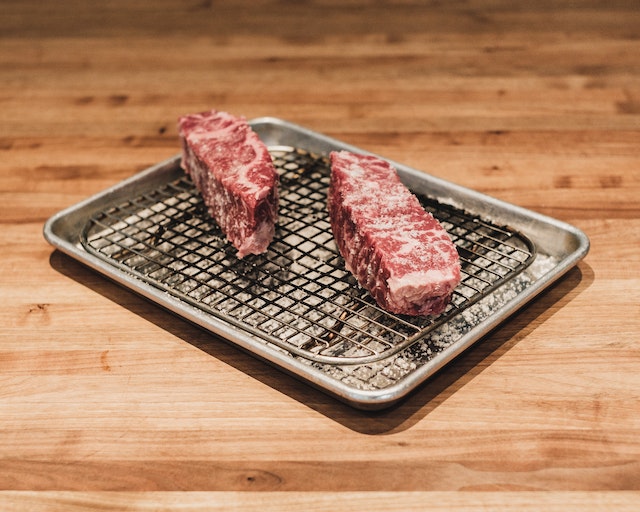
Is Wagyu Beef Worth the Price?
Yes, the unique flavor, tenderness, and indulgent experience of Wagyu beef make it well worth its high price.
Unique flavor and tenderness
The unique flavor and tenderness of Wagyu beef is one of the main reasons why it’s so expensive. When you take a bite of Wagyu beef, you’ll experience a rich and intense flavor that is unlike any other meat.
The marbling, or distribution of fat throughout the meat, gives it a melt-in-your-mouth texture that is incredibly tender. Additionally, Wagyu genetics and diet play a big role in its exceptional taste and tenderness.
The cattle are carefully raised on special feed that includes a high percentage of grain, which contributes to the development of delicious flavors in the meat. It’s this combination of genetics, diet, and marbling that makes Wagyu beef such a unique culinary experience worth indulging in occasionally.
Personal preference
For meat lovers, personal preference plays a big role in determining whether Wagyu beef is worth the price. Some people absolutely love the unique flavor and tenderness of Wagyu beef, considering it a culinary experience like no other.
The rich marbling and melt-in-your-mouth texture are highly prized by those who enjoy gourmet food. However, personal tastes vary, and not everyone may appreciate or be willing to pay for these qualities.
For some, indulging in Wagyu beef may be an occasional treat rather than an everyday choice. Ultimately, whether Wagyu beef is worth the price will depend on individual preferences and budget considerations.
Occasional indulgence
As a meat lover, I understand the appeal of indulging in something special from time to time. When it comes to Wagyu beef, it is definitely worth considering as an occasional treat.
The unique flavor and tenderness of Wagyu beef make it a truly unforgettable culinary experience. Every bite is like no other, with its melt-in-your-mouth texture and rich taste.
While Wagyu beef may come with a higher price tag compared to other types of meat, the quality and luxury it offers are well worth it. The marbling that runs through each cut of Wagyu beef gives it exceptional flavor and juiciness that you won’t find in any other type of beef.
Its exquisite taste is sure to leave you wanting more.
Whether you’re celebrating a special occasion or simply treating yourself to something extraordinary, indulging in Wagyu beef allows you to savor the finest flavors and textures that high-quality meat has to offer.
It’s an experience that food enthusiasts should not miss out on—something truly special for those who appreciate gourmet foods.
Conclusion
In conclusion, the high cost of Wagyu beef can be attributed to several factors. Limited land for cattle in Japan, strict regulations, and labor-intensive production processes all play a role in driving up the price.
Additionally, the unique genetics, diet, marbling, and taste of Wagyu beef make it a highly sought-after gourmet product. While it may not be an everyday indulgence for everyone due to its price tag, those who appreciate its exceptional flavor and tenderness often find it worth the occasional splurge.
FAQs
1. Why is Wagyu beef so expensive?
Wagyu beef is costly because of cattle breeding, high feed expenses and the cost of importing it from Japan.
2. What makes wagyu different from other beef?
High grade Wagyu, known as Kobe beef in Japanese cuisine, has a unique Beef grading system that marks its quality higher than most meats on the market.
3. Does farming style have an effect on the price of Wagyu?
Yes, wagyu farming practices add to the costs making this type of meat more expensive compared to others.
4. How does the meat market affect the pricing of Wagyu?
In the meat market, high-quality beef like Wagyu tends to be pricier due to its quality and limited availability.
Greetings!
With over two decades of diverse experience in the meat industry, I proudly stand as an expert in all things meat. My journey commenced with a strong foundation in hospitality, where I honed my culinary skills as a chef in prestigious restaurants and on luxurious superyachts worldwide.
However, my true passion lies in the art of butchery. Throughout my extensive career, I have had the privilege of working with renowned meat purveyors and mastering the craft of meat cutting and preparation. From breaking down whole carcasses to meticulously selecting prime cuts, my butchery expertise is at the core of my meat knowledge.
Having immersed myself in various cultures and cuisines, I have honed my skills to deliver exceptional dining experiences, crafting delectable dishes that celebrate the natural flavors of different meats. Whether it's sourcing the finest meats for discerning clients or sharing valuable tips on meat selection and cooking, I take pride in elevating the meat experience for both professionals and enthusiasts.
My journey has taken me from the bustling kitchens of top-rated restaurants to the heart of meat processing facilities, gaining insights and honing my skills to become a true meat connoisseur. Now, I am enthusiastic about sharing my expertise, offering valuable insights on meat selection, cooking techniques, and the art of butchery.

